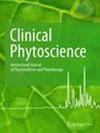Antidiabetic effects of aqueous leaf extract of Vernonia amygdalina on serum liver markers in streptozotocin-induced diabetic albino Rats: a new data to support its Anti-diabetic effect
引用次数: 0
Abstract
Numerous plants have been explored for their potential antidiabetic properties, and Vernonia amygdalina (VA) stands among them. This study aims to investigate the antidiabetic activities of VA and validate its efficacy. An aqueous extract of Vernonia amygdalina leaves was obtained through maceration. The antidiabetic effects of this plant extract were evaluated in vivo using diabetic model rats. Albino Wistar rats were induced into a diabetic state through intraperitoneal injection of streptozocin and subsequently treated with an optimal dose of 250 mg/kg aqueous extract of VA over a 21-day period. Parameters such as body weight, blood glucose levels, and serum marker enzymes were measured. The results demonstrated a significant reduction (p < 0.05) in the glucose levels of streptozocin-induced diabetic rats following treatment with VA extract, highlighting its potential as an antidiabetic agent that performed comparably to the reference drug, glimepiride. Additionally, a significant increase (p < 0.05) in the body weight of the treated diabetic rats was observed. Aqueous extracts also significantly (p < 0.05) altered the serum concentrations of alanine aminotransferase (ALT) and aspartate aminotransferase (AST) in a manner similar to the glimepiride-treated group. This study affirms the anti-diabetic effects of the aqueous extract of Vernonia amygdalina in streptozotocin-induced diabetic rats and suggests that the extract holds promise as an important phytomedicine for the development of more effective treatments for diabetes.杏仁蕨水叶提取物对链脲佐菌素诱导的糖尿病白化大鼠血清肝脏指标的抗糖尿病作用:支持其抗糖尿病作用的新数据
许多植物都具有潜在的抗糖尿病特性,杏仁蕨(VA)就是其中之一。本研究旨在调查 VA 的抗糖尿病活性并验证其功效。研究人员通过浸泡法获得了杏仁蕨叶的水提取物。利用糖尿病模型大鼠对该植物提取物的抗糖尿病作用进行了体内评估。通过腹腔注射链脲霉素诱导白化 Wistar 大鼠进入糖尿病状态,然后用最佳剂量 250 毫克/千克的 VA 水提取物治疗 21 天。对体重、血糖水平和血清标志酶等参数进行了测量。结果表明,使用 VA 提取物治疗后,链脲佐菌素诱导的糖尿病大鼠的血糖水平明显降低(p < 0.05),这凸显了 VA 作为一种抗糖尿病药物的潜力,其表现与参考药物格列美脲相当。此外,还观察到接受治疗的糖尿病大鼠体重明显增加(p < 0.05)。水提取物还能明显(p < 0.05)改变丙氨酸氨基转移酶(ALT)和天冬氨酸氨基转移酶(AST)的血清浓度,其方式与格列美脲处理组相似。这项研究证实了杏仁蕨水提取物在链脲佐菌素诱导的糖尿病大鼠中的抗糖尿病作用,并表明该提取物有望成为一种重要的植物药,用于开发更有效的糖尿病治疗方法。
本文章由计算机程序翻译,如有差异,请以英文原文为准。
求助全文
约1分钟内获得全文
求助全文
来源期刊
自引率
0.00%
发文量
18
审稿时长
13 weeks
期刊介绍:
Clinical Phytoscience is an international, peer-reviewed, interdisciplinary, and open access journal publishing high quality research articles on clinical evidence and use of medicinal plants in the development of efficient and well tolerated phytotherapy. Clinical Phytoscience focuses on phytotherapy, looking at proof of concept, efficacy and safety, to be established “at eye level” compared to pharmacotherapy. The emphasis lies on application oriented topics (efficacy and safety of phytotherapy in a specific indication, including its need and acceptance by the patient). The scientific results published in the journal should contribute to the recovery and maintenance of human health by phytotherapy. Clinical Phytoscience will publish high-quality evidence-based clinical studies and relevant pharmacological studies. Key areas of interest are: -Upper and lower airways, ENT and pneumology -Gynecology -Urology -Nephrology Pediatrics -Intestinal tract -Hepatology -Diabetes/metabolic Syndrome -Immunology and microbiology -Hygiene -Analytics

 求助内容:
求助内容: 应助结果提醒方式:
应助结果提醒方式:


